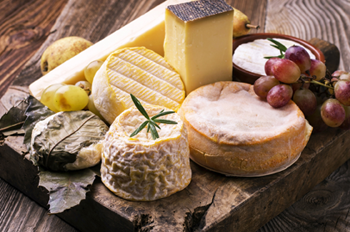 Coming back to France
Coming back to France  Map of French gastronomy
Map of French gastronomy
Since 2010, French cuisine is in the Intangible Cultural Heritage of the UNESCO. Its cooking is rich in colours and flavours. Here's a short stroll in French regions.
Starters: Cured meats or salads
Pâtés lorrains (Lorraine pie) or rillettes du Mans (Mans pate): French cured meats have “musts” to start a meal.
Foie gras (duck or goose liver) is a delicacy from the Aquitaine region. A perfect match is a Sauternes, a sweet white wine from the Bordeaux vineyards.
If you prefer a light starter, the salade niçoise (Nice salad) offers the most typical productions from the Mediterranean area: tomatoes, bell pepper, anchovies, olive oil, and others.
Main course: meat or fish depending on the "terroir" (local soil)
As a main dish, meat can be prepared in many different ways, which illustrates the diversity of French soils ("terroirs").
In the Sauerkraut, pork is cooked with cabbage, potatoes and white wine from Alsace. The South-West cassoulet couples white beans with duck or pork bits. Those are two great recipes that need slow cooking... and a good nap after the meal!
The size of coastlines in France explains the presence of fish and seafood in French cuisine: oysters from Britany or Aquitaine, sole meunière (king Louis XIVth's favorite) or even bouillabaisse from Marseille.
Cheese: one per day!
It's impossible to list all cheeses in France: supposedly, the country has at least 365. The camembert from Normandy and Roquefort from the Pyrenees area are among the most famous.
Dessert: pastries to everyone's taste
In dessert, the Saint-Honoré, covered with Chantilly cream, and the Opéra, a delicacy with chocolate and coffee, reflect the elegance of France's pastries.
Other recipes come from lower-class traditions, like the Breton crêpes (pancakes) or the Poumpet, a speciality from the Tarn region with puff pastry dough.
